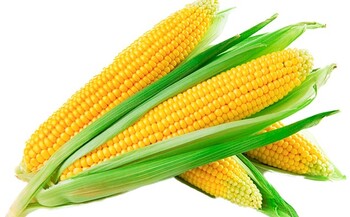
Written by Sharon Maguire © Dog Breed Info Center®
If you look at the ingredients of the vast majority of major brand dog foods sold in your local grocery store you will see most of them contain some type of corn such as corn meal. Fact, dogs are meat eaters, even their teeth tell us this. They do not have grinding molars, they have ripping canines. Have you ever heard of a farmer having issues with dogs raiding their corn fields? No, what we might hear is a dog raiding the chicken coop for meat.
Corn has been linked to many dog ailments such as allergies, joint swelling, bloat and there have been some cases of aflatoxin contamination associated with corn in dog food. The corn that is used in dog food is sometimes contaminated with mycotoxins (toxins from mold or fungi). Corn metabolizes in dogs similar to the way sugar metabolizes in humans. It's like feeding a child foods high in corn syrup. The dog is not going to be as healthy and may experience energy rushes, crashes, hyperactivity and a hard time concentrating. Studies have also shown that high doses of corn can inhibit serotonin in the brain. Serotonin is an important chemical that reduces stress and anxiety.
If you look at the ingredients of the vast majority of major brand dog foods sold in your local grocery store you will see most of them contain some type of corn such as corn meal. Fact, dogs are meat eaters, even their teeth tell us this. They do not have grinding molars, they have ripping canines. Have you ever heard of a farmer having issues with dogs raiding their corn fields? No, what we might hear is a dog raiding the chicken coop for meat.
Corn has been linked to many dog ailments such as allergies, joint swelling, bloat and there have been some cases of aflatoxin contamination associated with corn in dog food. The corn that is used in dog food is sometimes contaminated with mycotoxins (toxins from mold or fungi). Corn metabolizes in dogs similar to the way sugar metabolizes in humans. It's like feeding a child foods high in corn syrup. The dog is not going to be as healthy and may experience energy rushes, crashes, hyperactivity and a hard time concentrating. Studies have also shown that high doses of corn can inhibit serotonin in the brain. Serotonin is an important chemical that reduces stress and anxiety.
|
A dog's body cannot process corn properly. It is difficult for them to digest it. Corn is a cheap filler, a starchy energy which serves little to no nutritional value. A lot of it comes out in their waste.
All of this was brought to my attention when my very keen Pit Bull puppy started refusing to eat is food. After doing some research on the ingredients in his dog food it didn't take long to realize between the grains and the bi-products, among other non healthy ingredients, he was being asked to eat something that was not good for him. When I switched my dogs over from a corn based dog food to a grain free dog food I noticed that their poop was smaller. I quickly realized I had to start feeding them less food or they were going to gain weight. Their bodies were using what they were eating instead of pooping it out. |
So why is corn being put in their dog food?
Back in the days of the great depression the first farm bill was passed. The Agricultural Act of 1938 mandated price supports for corn along with cotton, and wheat. To this day corn is still subsidized by the government. What that means is for every bushel of corn a farmer grows in America the American government pays the farmer with tax payer money. A lot of corn farmers only make money from corn because there are a few different subsidies from the government they get for every bushel of corn they grow. So they grow more and more. It does not even have to be a good quality corn, just corn. They don't have to compete, they get money for whatever they grow, guaranteed. They don't even have to make it taste good or be good for you.
Back in the days of the great depression the first farm bill was passed. The Agricultural Act of 1938 mandated price supports for corn along with cotton, and wheat. To this day corn is still subsidized by the government. What that means is for every bushel of corn a farmer grows in America the American government pays the farmer with tax payer money. A lot of corn farmers only make money from corn because there are a few different subsidies from the government they get for every bushel of corn they grow. So they grow more and more. It does not even have to be a good quality corn, just corn. They don't have to compete, they get money for whatever they grow, guaranteed. They don't even have to make it taste good or be good for you.
They genetically modified it to be resistant to a pesticide, to grow tall and close together and to grow fast and starchy. It's not the same type of corn the Indians used to grow which had more nutrition and protein. This corn is genetically modified.
As a result, America has an over abundance of corn. The government along with companies are always working on what they can use the corn for. It is put in a high percentage of human and animal foods in many different forms. It has been said that if you test a human hair you can find traces of corn produced carbon.
What's in your dog's food?
As a result, America has an over abundance of corn. The government along with companies are always working on what they can use the corn for. It is put in a high percentage of human and animal foods in many different forms. It has been said that if you test a human hair you can find traces of corn produced carbon.
What's in your dog's food?
Information on GMO Sweet Corn
Unbeknownst to the majority of consumers, in the summer of 2012 large quantities of GMO sweet corn appeared on grocery store shelves and roadside produce stands. In 2011, Monsanto announced plans to grow genetically modified sweet corn on 250,000 acres, roughly accounting for 40 percent of the sweet corn market. The sweet corn is being used for frozen and canned corn products, and is also available fresh across the country.
Here are key facts you need to know:
What?
GMO sweet corn is genetically engineered to be herbicide resistant (Roundup Ready) and to produce its own insecticide (Bt Toxin). Like all GMOs, genetically modified sweet corn has not been thoroughly tested to ensure that it is safe for consumption.
Who?
While GMO sweet corn has been produced in the past by Syngenta, this is the first attempt by a biotech company to corner the sweet corn market.
Where?
GMO sweet corn can be found in the produce aisle of your local food store and at farmers’ markets and farmstands. It can also be found in processed foods that contain sweet corn.
Unbeknownst to the majority of consumers, in the summer of 2012 large quantities of GMO sweet corn appeared on grocery store shelves and roadside produce stands. In 2011, Monsanto announced plans to grow genetically modified sweet corn on 250,000 acres, roughly accounting for 40 percent of the sweet corn market. The sweet corn is being used for frozen and canned corn products, and is also available fresh across the country.
Here are key facts you need to know:
What?
GMO sweet corn is genetically engineered to be herbicide resistant (Roundup Ready) and to produce its own insecticide (Bt Toxin). Like all GMOs, genetically modified sweet corn has not been thoroughly tested to ensure that it is safe for consumption.
Who?
While GMO sweet corn has been produced in the past by Syngenta, this is the first attempt by a biotech company to corner the sweet corn market.
Where?
GMO sweet corn can be found in the produce aisle of your local food store and at farmers’ markets and farmstands. It can also be found in processed foods that contain sweet corn.
How can I keep GMO sweet corn off my plate?
At this time the Non-GMO Project does not have any verified sweet corn, however eating Certified Organic sweet corn is a great step towards protecting you and your family from this experimental food. Under the regulations of the National Organic Program, Certified Organic farmers are not allowed to knowingly plant GMO seed.
Sourced from: http://www.nongmoproject.org/learn-more/
At this time the Non-GMO Project does not have any verified sweet corn, however eating Certified Organic sweet corn is a great step towards protecting you and your family from this experimental food. Under the regulations of the National Organic Program, Certified Organic farmers are not allowed to knowingly plant GMO seed.
Sourced from: http://www.nongmoproject.org/learn-more/
















